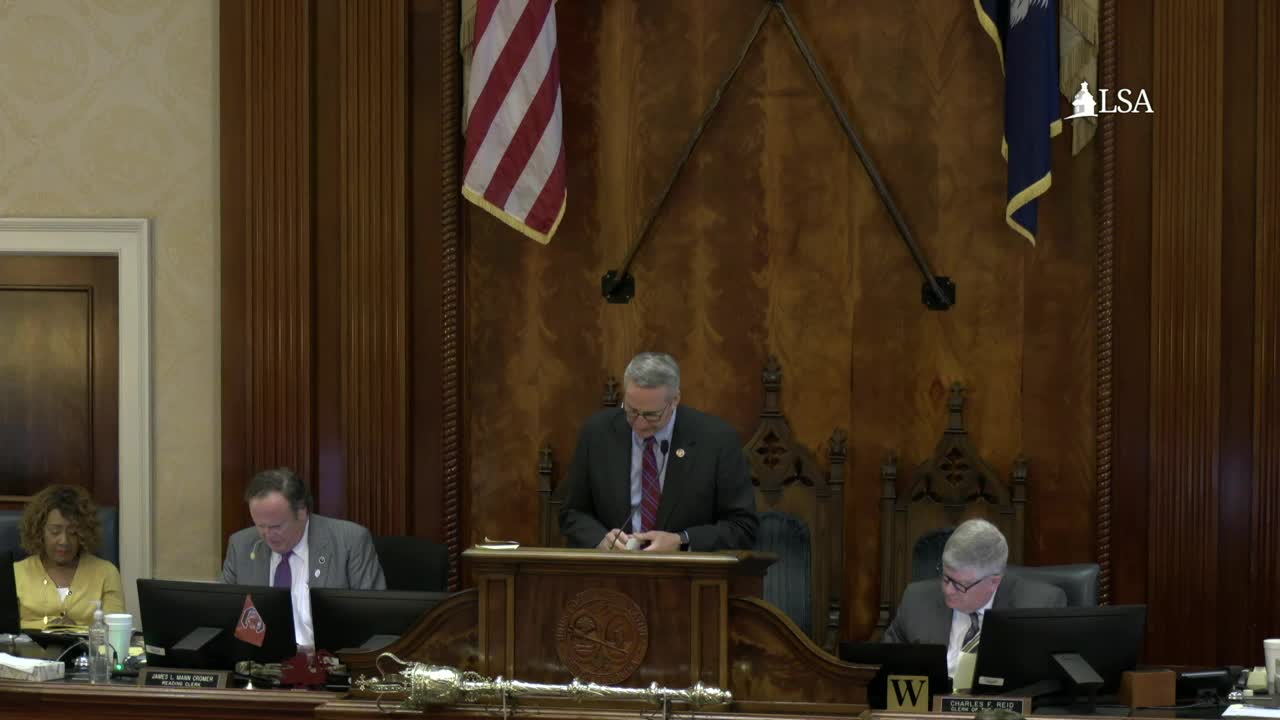House narrows subpoena power for internet child‑exploitation probes, adds judge review
Get AI-powered insights, summaries, and transcripts
Subscribe
Summary
After hours of debate, the South Carolina House approved changes to Senate Bill 74 that allow the attorney general to request subscriber information from internet providers in Internet Crimes Against Children (ICAC) investigations but require a circuit court judge to find probable cause before a subpoena issues.
The South Carolina House of Representatives on April 23, 2025, amended Senate Bill 74 to let the attorney general request subscriber identifying information from internet service providers in Internet Crimes Against Children (ICAC) investigations — provided a South Carolina circuit court judge first finds probable cause, lawmakers voted.
The change came after several hours of floor debate in which proponents said the measure would speed investigations into online child exploitation and opponents warned it would undercut Fourth Amendment protections and could be misused. The House adopted a series of committee and floor amendments that narrowed the bill’s scope and added the judicial‑review safeguard before advancing the measure on second reading.
Why it matters: Prosecutors and investigators said they now must route some requests for subscriber data through federal channels, causing delays that can hinder time‑sensitive child‑exploitation investigations. Civil liberties advocates and some legislators countered that allowing the state executive branch to compel internet providers to disclose subscriber or transactional data without court review risks privacy intrusions and could be used beyond the bill’s intended scope.
Details of the final measure and floor action
- Scope limited to subscriber/transactional data: The bill’s sponsor, Representative Travis Moore, repeatedly described the subpoena as an administrative tool limited to non‑content, subscriber information — for example, the name and address associated with an IP address — and not a means to obtain message content. “An administrative subpoena … only allows them to get the subscriber data from the provider,” Moore told colleagues during debate.
- Authority narrowed and confined to ICAC: Committee changes removed earlier language that would have authorized circuit solicitors and the State Law Enforcement Division (SLED) to issue these subpoenas. The floor language confines the authority to the attorney general and ties it to investigations conducted by the ICAC task force.
- Judicial probable‑cause safeguard added: After members expressed concerns about potential abuse, Representative Seth Rose offered an amendment requiring the attorney general to present evidence to a South Carolina circuit court judge and obtain a probable‑cause finding before a subpoena may be issued. That amendment ultimately passed on the floor after votes on competing motions and amendments.
What supporters said
Supporters argued the bill closes a procedural gap that slows investigations. “This is about getting the information necessary to continue an investigation — not the content of communications,” Moore said, adding that the federal Stored Communications Act already distinguishes the two and that the state’s change would mirror existing administrative‑subpoena frameworks used elsewhere. Moore said delays in obtaining subscriber information from federal authorities can cost investigators months and lessen the chance of catching perpetrators.
What critics said
Opponents pressed for judicial review as an essential check on executive power. “Why are we not requiring the attorney general’s office to have to fill out a sworn affidavit and take this to a judge to be signed?” Representative Rose asked on the floor, arguing that a neutral, detached magistrate should vet requests before the state compels private data. Representative Todd Rutherford warned against incremental erosion of constitutional protections, saying, “Once we give our rights away, they are gone.”
Floor votes and amendment path
The House adopted the committee amendment that narrowed issuing authority and restricted the bill to ICAC‑related investigations. Later floor amendments further limited the subpoena to subscriber information and added the circuit court probable‑cause review. After the final package of amendments, the chamber approved the measure on second reading; the clerk recorded the second‑reading tally as 105‑0.
Next steps
Members noted the bill may receive technical edits on third reading. Representative Brandon Newton announced there may be technical amendments before the next floor consideration. If the bill remains as amended, it will return for third reading and a final passage vote before it can move to the Senate (if Senate concurrence or action is required) or to enrollment, depending on the bill’s origin and posture.
Discussion points recorded on the floor
- Investigative need vs. privacy: Proponents emphasized timeliness for ICAC investigations; critics emphasized the need for judicial oversight and expressed concern about potential misuse. - Scope of data: The body debated non‑content subscriber data versus content and transactional records; final floor language narrowed the permissible disclosure to subscriber identification tied to specific IP addresses in ICAC probes. - Authority: Committee language removed SLED and solicitors’ ability to issue subpoenas; final floor package left sole issuing authority with the attorney general but required judicial sign‑off.
Ending: With the judicial‑review amendment adopted, the bill’s supporters say the measure balances investigators’ need for speed with a judicial check; civil‑liberties proponents say they will monitor implementation closely and expect courts to provide a further line of protection.
